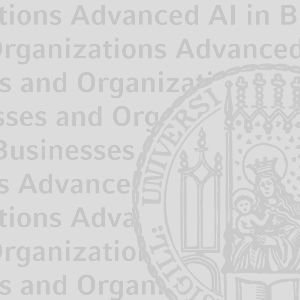- DE - Bitte beachten: Es gibt keine deutsche Kursseite, da der Kurs nur in Englisch angeboten wird.
- EN - Please note: This page has no German version because the course is only offered in English.
Quick Info: Master | Seminar | English | Summer Semester | 6 ECTS
Eligibility Notice for Enrollment
This seminar is exclusively for students enrolled in the MMT, MBR, and M.Sc. BWL programs. Please verify your eligibility before enrolling, as registrations from ineligible students will not be accepted.
Description
In this seminar, students will implement an advanced machine learning project. The machine learning project should be of value to the decision-making in businesses, organizations, and society. We consider this an advanced course for specialization.
This is a hands-on course where students are asked to implement machine learning in a self-determined way and eventually present the results to a scientific audience (video presentation). As such, the focus is almost exclusively on methodological aspects that arise from the underlying mathematics.
During the project, students will need to engage in the following tasks related to practical implementations:
- Pre-process data to transform it into relational structures
- Apply statistical software (e.g., R and/or Python) to perform business analytics in practice
- Evaluate the results to choose the best-performing method

